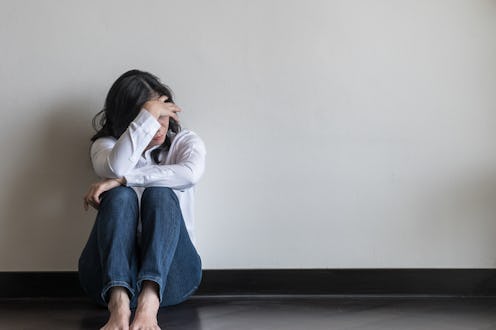Life
6 Quick-Fixes For Anxiety That You Shouldn’t Be Doing, According To Experts

Managing anxiety can often be difficult. Feeling anxious can be uncomfortable and even scary, and it’s common to want to make that feeling go away as quickly as possible. However, many “quick-fixes” for anxiety can be harmful in the long-term.
“These approaches aren’t always bad,” Dr. Omar Manejwala, a psychiatrist and chief medical officer at the healthcare company Catasys, tells Bustle. “Sometimes they can be a healthy way to relieve stress and anxiety. But sometimes they can be bad for you.”
Many coping mechanisms for anxiety are fine in moderation, but can quickly become detrimental to your health if made a habit or taken to extremes. Additionally, Manejwala says that they can often distract from the real problem.
“It turns out that the more you try to avoid dealing with anxiety, the worse it gets,” Manejwala says.
He also notes that it’s important to recognize that some anxiety is normal — it is a natural bodily reaction to stressful situations. However, he says when anxiety starts interfering significantly with your enjoyment of life, it’s best not to turn to “quick-fixes.” He recommends looking into more long-term treatments, like therapy.
To find out which easy remedies are potentially harmful, experts reveal some strategies you probably shouldn’t be using to cope with anxiety.
1Drinking Caffeine
If you’re feeling overwhelmed at work, it's natural to reach for a cup of coffee. In the short-term, caffeine will help you feel sharp and concentrated. However, it can also worsen your anxiety in the long-term.
“Although it may initially make us feel focused and on top of things it can ultimately worsen anxiety as it is a stimulant,” Dr. Alex Anastasiou, a psychiatrist in Pleasanton, CA, tells Bustle.
Studies have show the caffeine has many beneficial effects, like increasing cognitive performance and potentially helping you retain information, the American Psychological Association says. But its stimulant qualities can make you jittery and trigger anxiety. Next time you’re anxious, it might be a good idea to reach for something decaffeinated instead.
2Smoking Cigarettes
In the moment, a cigarette can have a calming effect in a bout of anxiety. However, over time, using cigarettes to alleviate stress can actually increase stress.
“Nicotine withdrawal causes irritability and anxiety,” Anastasiou says.
While smoking may seem like a relaxing choice the moment, it can eventually make your anxiety worse. If you need help quitting smoking, there are many resources like the American Lung Association.
3Drinking Alcohol
People often have a drink to unwind after a long day. However, this may not be the best solution to anxiety.
“Mild alcohol withdrawal, which can happen after just a few drinks, can worsen anxiety, so what you used to help you will actually make the problem worse later,” Dr. Manejwala says.
It's unlikely that you would experience alcohol withdrawal if you only drink occasionally. If you drink consistently, you could go through withdrawal and experience symptoms like headaches, nausea, and anxiety.
Drinking does have relaxing effects, but will likely make you feel worse later if it becomes a habit. If you would like to get help for an alcohol problem, be sure to seek out a medical professional.
Editor's Note: If you or someone you know is seeking help for substance use, call the SAMHSA National Helpline at 1-800-662-HELP(4357).
4Overspending
Anastasiou says that shopping leads to “a temporary increase in dopamine which creates pleasure.” As great as shopping can feel, spending money to cope with anxiety can be quickly unsustainable.
Anastasiou says that debt can be a huge cause of anxiety, so it’s a good idea to avoid big purchases if you’re feeling stressed. Additionally, you can always seek out a therapist or trained medical professional to help cope with anxiety.
5Lashing Out
A common reflex when someone feels anxious is to snap at the people around them. Lashing out can be a release of stress, but it can also be isolating.
“Taking out stress on others through negative words or actions can lead to breakdown of friendships and relationships in personal life and at work,” Anastasiou says.
To avoid lashing out, you can employ relaxation techniques like deep breathing or counting to 10. Having a good support system can help someone whose dealing with anxiety, so isolating yourself when you're stressed should probably be avoided.
6Oversleeping
When you’re feeling anxious, it’s tempting just to crawl into bed. While getting a healthy night’s sleep is crucial for mental health, oversleeping can have negative consequences.
“Sleeping more than 10 hours a day can result in worsened physician health such as heart disease [...] and depression,” Anastasiou says.
Oversleeping can also be a symptom of depression. If you would like to seek help for anxiety or depression, you can contact a medical professional like a therapist.
Not all of these methods are inherently bad; some of them are fine in moderation. But these “quick-fixes” can have negative impacts in the long-term, and so you should be careful about making any of them a habit when coping anxiety.
This article was originally published on